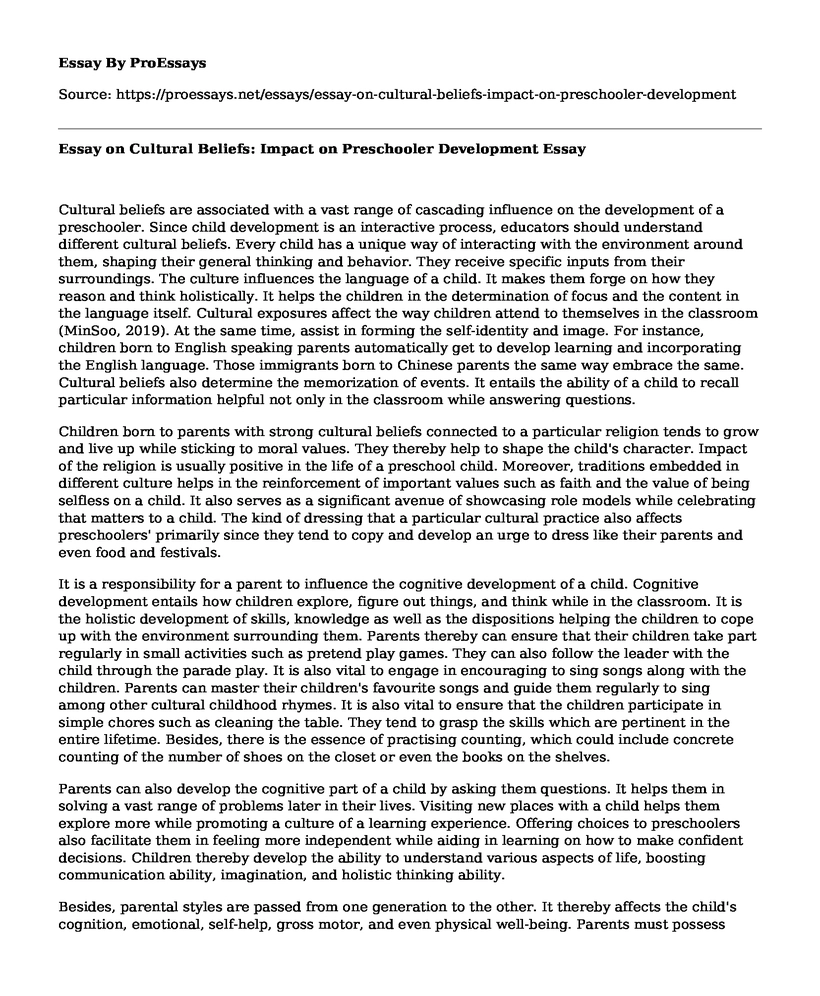Cultural beliefs are associated with a vast range of cascading influence on the development of a preschooler. Since child development is an interactive process, educators should understand different cultural beliefs. Every child has a unique way of interacting with the environment around them, shaping their general thinking and behavior. They receive specific inputs from their surroundings. The culture influences the language of a child. It makes them forge on how they reason and think holistically. It helps the children in the determination of focus and the content in the language itself. Cultural exposures affect the way children attend to themselves in the classroom (MinSoo, 2019). At the same time, assist in forming the self-identity and image. For instance, children born to English speaking parents automatically get to develop learning and incorporating the English language. Those immigrants born to Chinese parents the same way embrace the same. Cultural beliefs also determine the memorization of events. It entails the ability of a child to recall particular information helpful not only in the classroom while answering questions.
Children born to parents with strong cultural beliefs connected to a particular religion tends to grow and live up while sticking to moral values. They thereby help to shape the child's character. Impact of the religion is usually positive in the life of a preschool child. Moreover, traditions embedded in different culture helps in the reinforcement of important values such as faith and the value of being selfless on a child. It also serves as a significant avenue of showcasing role models while celebrating that matters to a child. The kind of dressing that a particular cultural practice also affects preschoolers' primarily since they tend to copy and develop an urge to dress like their parents and even food and festivals.
It is a responsibility for a parent to influence the cognitive development of a child. Cognitive development entails how children explore, figure out things, and think while in the classroom. It is the holistic development of skills, knowledge as well as the dispositions helping the children to cope up with the environment surrounding them. Parents thereby can ensure that their children take part regularly in small activities such as pretend play games. They can also follow the leader with the child through the parade play. It is also vital to engage in encouraging to sing songs along with the children. Parents can master their children's favourite songs and guide them regularly to sing among other cultural childhood rhymes. It is also vital to ensure that the children participate in simple chores such as cleaning the table. They tend to grasp the skills which are pertinent in the entire lifetime. Besides, there is the essence of practising counting, which could include concrete counting of the number of shoes on the closet or even the books on the shelves.
Parents can also develop the cognitive part of a child by asking them questions. It helps them in solving a vast range of problems later in their lives. Visiting new places with a child helps them explore more while promoting a culture of a learning experience. Offering choices to preschoolers also facilitate them in feeling more independent while aiding in learning on how to make confident decisions. Children thereby develop the ability to understand various aspects of life, boosting communication ability, imagination, and holistic thinking ability.
Besides, parental styles are passed from one generation to the other. It thereby affects the child's cognition, emotional, self-help, gross motor, and even physical well-being. Parents must possess good parenting styles in order to nurture responsible and critical thinkers for the next generation.
References
MinSoo Kim-Bossard, Jennifer Choi & Alejandra Meneses (2019) Navigating different cultural beliefs and practices to support immigrant preschoolers and their families: a Bakhtinian textual analysis on preschool teacher and administrator perspectives, Early Child Development and Care, 189:14, 2347-2359,
Cite this page
Essay on Cultural Beliefs: Impact on Preschooler Development. (2023, May 21). Retrieved from https://proessays.net/essays/essay-on-cultural-beliefs-impact-on-preschooler-development
If you are the original author of this essay and no longer wish to have it published on the ProEssays website, please click below to request its removal:
- Planned Parenthood Interest Group Essay
- Available School Resources for Children With Emotional and Behavioral Problems
- Essay Example on Celebrities & C-Section: Women's Rights, Healthcare, Risks/Benefits
- Surprising Introduction to ENGL110: Instructor's Unique Teaching Style - Essay Sample
- Essay on Rewarding Energy Used in Athletics: Exploring College Payment & Nurturing Talent
- Paper Example on Infants Drug Withdrawal: Nurses, Acuity & Parental Needs
- Essay Sample on Right to Religious Freedom vs Duty to Protect Children







